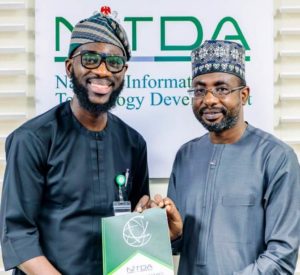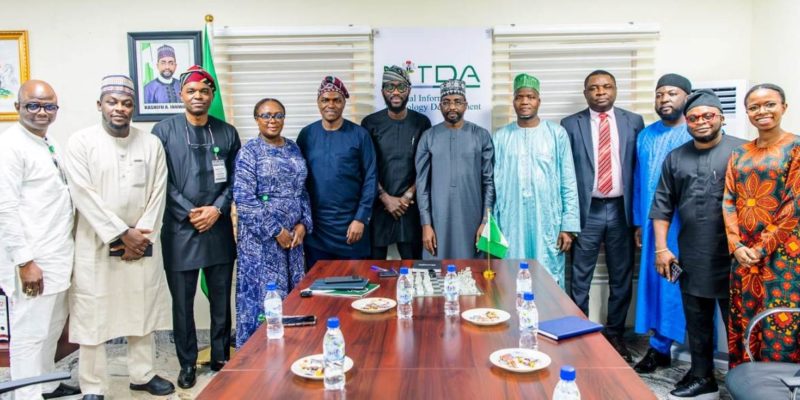
L-R: Google’s Balogun and NITDA’s Abdullahi
Google West Africa, this week in Abuja, says it will be deepening its collaboration with the National Information Technology Development Agency (NITDA) as it presents its new director for West Africa, Mr. Olumide Balogun.
Balogun takes over from Juliet Ehimuan, Google’s first West Africa Director, who resigned weeks back after 12 years.
The new helmsman led other Google executives to the NITDA where he met its Director General, Kashifu Inuwa Abdullahi and other senior officials of the agency.
Visit to reiterate Google’s commitments to partnership
Balogun said the visit is to reiterate Google West Africa’s commitments to deepening the existing partnership with NITDA.
“I have been at Google for four years, recently now taking over the West Africa Director lead role. And our coming here today is to identify the critical steps that we need to take to jointly actualise the Nigerian President’s initiative to drive 1 million digital jobs because Google cannot thrive in isolation,” said Balogun who revealed that Google has been working on Africa’s Internet space for over eight years.
According to him, “In 2015, during our premier developer event, we announced that Google has shifted from being a mobile first company to an AI first company. So, we were quite amused with all the Chat GPT conversations.”
He said Google was currently working on a document that would detail the impact of artificial intelligence in Africa which will be launched in University of Johannesburg, South Africa in September.
The NITDA boss assured Google of government continuous support for its initiatives in the country including the push to create one million digital jobs.
NITDA positioning Nigeria for accelerated digital jobs
He said NITDA was positioning Nigeria for accelerated job creation in a digital economy. His words: “we are looking at the Nigeria Startup Act, which identifies some initiatives such as the talent development that can enable job creation. Nigeria can position itself to bridge the gap because we have youthful population.”
He added that government remain committed to its responsibilities which include creating right policies and regulations; deploying infrastructure where needed, and ensuring that the right regulations are able to help create market, democratize access to services, protect consumers, enhance service delivery and enable innovation.
“Basically, Regulation can be rule based and non-rule based. Non-rule based is what we advocated for. To allow the ecosystem players to self-regulate themselves, put the standard in place, and we can help to ensure new entrance comply to that standard because what we are after is to have a responsible and ethical views of platforms around the world,” he said.
According to him, Nigeria could position itself to bridge the gap in digital transformation because it has a youthful population.
“In 2018, digitally transformed enterprise contributed 18.5% global GDP. It was projected to reach 53.3% this year, that is over 50% of the global GDP. The generative AI is going to add about seven trillion US dollars,” said Abdullahi while acknowledging that NITDA’s partnership with Google Developers Group has resulted in the training of 150,000 youths in Nigeria.
Adding: “Presently we have an initiative running here in Abuja at our National Center for Artificial Intelligence and Robotics (NCAIR), and we want to expand same programme to other states in collaboration with the GDG as well. We are looking at how we can build technology development zones in partnership with universities to promote smart manufacturing.”
“Similarly, we are also looking at how to establish the seed investment fund to all the startups to attract investment. Last year, over 626 billion was invested but only 3.5% came to Africa and if you look at our population, we can do more than that; these are some of the ideas we need the stakeholders like you to come work with us on.”
































